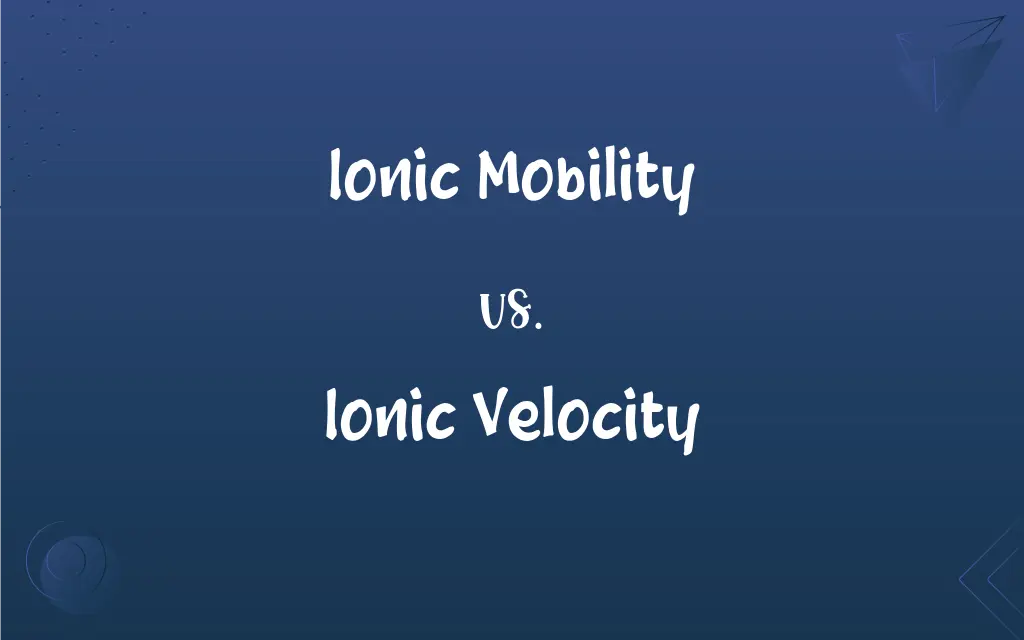Ionic Mobility vs. Ionic Velocity: What's the Difference?
Edited by Aimie Carlson || By Janet White || Published on November 25, 2024
Ionic mobility refers to the speed at which an ion moves through a medium under the influence of an electric field, usually expressed in cm²/Vs. Ionic velocity, on the other hand, is the actual speed of an ion in motion, typically measured in m/s.

Key Differences
Ionic mobility is a measure of how easily an ion can move through a medium when subjected to an electric field. It is defined as the velocity of the ion per unit electric field strength. Ionic mobility is influenced by factors such as the size and charge of the ion, the viscosity of the medium, and the temperature. Ionic velocity, in contrast, refers to the actual speed at which an ion travels in a medium. It is determined by the strength of the electric field applied and the mobility of the ion. The velocity can be calculated by multiplying the ionic mobility by the electric field strength.
When comparing ionic mobility and ionic velocity, it's important to note that mobility is an intrinsic property of the ion, while velocity is a situational measure that depends on external factors like the electric field. Mobility provides insight into the efficiency of ion movement, whereas velocity gives the actual speed of the ion under specific conditions.
Both ionic mobility and ionic velocity are crucial in understanding the behavior of ions in various applications, such as in electrochemistry, ion transport in biological systems, and the operation of ion-selective electrodes. By studying these properties, scientists can better understand and control the movement of ions in different environments.
Ionic mobility and ionic velocity are related, they represent different aspects of ion movement. Mobility is a fundamental property that describes the ease of ion movement, while velocity is a measure of the actual speed of an ion under a given electric field.
Comparison Chart
Definition
Speed of ion movement per unit electric field strength.
Actual speed of ion movement in a medium.
ADVERTISEMENT
Units
Cm²/Vs or m²/Vs
M/s or cm/s
Dependency
Intrinsic property of ion, depends on ion characteristics and medium.
Depends on external electric field strength.
Measurement
Indicates ease of ion movement.
Indicates actual speed of ion movement.
Application
Used to understand ion transport efficiency.
Used to calculate actual ion travel speed.
Ionic Mobility and Ionic Velocity Definitions
Ionic Mobility
Ionic mobility quantifies the speed at which an ion travels per unit electric field strength.
Scientists study ionic mobility to predict how quickly ions will travel through a solution under an applied electric field.
ADVERTISEMENT
Ionic Velocity
Ionic velocity is determined by the product of ionic mobility and the strength of the electric field.
Increasing the electric field strength will increase the ionic velocity of ions in a solution.
Ionic Mobility
Ionic mobility is a key parameter in electrochemical reactions, reflecting the efficiency of ion movement.
In a battery, the ionic mobility of the electrolyte ions determines how quickly the battery can charge and discharge.
Ionic Velocity
Ionic velocity provides insight into the kinetics of ion transport and reaction rates in electrochemical processes.
In electroplating, the ionic velocity of metal ions affects the rate at which the metal is deposited on the substrate.
Ionic Mobility
Ionic mobility is influenced by factors such as the size and charge of the ion and the viscosity of the medium.
The ionic mobility of larger ions is generally lower due to increased resistance to movement in the medium.
Ionic Velocity
Ionic velocity is the speed at which an ion moves through a medium under the influence of an electric field.
The ionic velocity of chloride ions in an electric field can be measured to understand their behavior in electrolysis.
Ionic Mobility
Ionic mobility is crucial in the operation of ion-selective electrodes and ion transport in biological systems.
In nerve cells, the ionic mobility of potassium and sodium ions is essential for transmitting electrical signals.
Ionic Velocity
Ionic velocity is a crucial factor in the design and optimization of devices such as ion thrusters and electrochromic displays.
In an ion thruster, the ionic velocity of the propellant ions determines the thrust generated by the device.
Ionic Mobility
Ionic mobility is the measure of an ion's ability to move through a medium in response to an electric field.
The ionic mobility of sodium ions in water is higher than that of calcium ions, indicating that sodium ions move more easily through water.
Ionic Velocity
Ionic velocity varies with changes in the electric field, ion characteristics, and the properties of the medium.
The ionic velocity of ions in a viscous medium will be lower than in a less viscous medium due to increased resistance to movement.
FAQs
What factors affect ionic mobility?
Ionic mobility is affected by the size and charge of the ion, the viscosity and temperature of the medium, and the presence of other ions or molecules.
How is ionic velocity different from ionic mobility?
Ionic velocity is the actual speed of an ion moving in a medium, measured in m/s or cm/s, while ionic mobility is a measure of the ease of movement per unit electric field.
Why is understanding ionic mobility important in electrochemistry?
Ionic mobility is important in electrochemistry because it helps predict how ions will move in an electric field, which is crucial for understanding and controlling electrochemical reactions.
What is ionic mobility?
Ionic mobility is a measure of how easily an ion moves through a medium under an electric field, expressed in cm²/Vs or m²/Vs.
Can ionic velocity be calculated from ionic mobility?
Yes, ionic velocity can be calculated by multiplying the ionic mobility by the strength of the electric field applied.
Can ionic mobility be used to identify ions in a solution?
Yes, ionic mobility can be used in techniques like ion mobility spectrometry to identify and separate ions based on their mobility.
Is ionic velocity constant for an ion in a given medium?
Ionic velocity can vary depending on the strength of the electric field and other factors, so it is not constant for an ion in a given medium.
How does ionic mobility influence the performance of batteries?
In batteries, higher ionic mobility in the electrolyte allows for faster ion transport, leading to quicker charging and discharging rates.
How is ionic mobility measured experimentally?
Ionic mobility is often measured using techniques like electrophoresis or conductivity measurements in an electrolyte solution.
Are ionic mobility and ionic velocity the same for all ions in a solution?
No, ionic mobility and ionic velocity can vary for different ions in a solution depending on their size, charge, and interactions with the medium.
How does ionic velocity impact the efficiency of electroplating?
In electroplating, higher ionic velocity can lead to faster deposition rates and more efficient metal coating processes.
How does ionic velocity affect the operation of ion thrusters in space propulsion?
In ion thrusters, higher ionic velocity leads to greater thrust and efficiency in space propulsion systems.
How do temperature and medium viscosity affect ionic mobility?
Higher temperatures generally increase ionic mobility by reducing the viscosity of the medium, while higher viscosity tends to decrease ionic mobility.
How do ionic mobility and ionic velocity influence the design of ion-exchange membranes?
Ionic mobility and velocity influence the design of ion-exchange membranes by determining the efficiency of ion transport and separation.
Can ionic mobility be used to predict reaction rates in electrochemical processes?
Yes, ionic mobility can be used to predict reaction rates in electrochemical processes by indicating how quickly ions can move to the electrodes.
Is ionic velocity always proportional to the electric field strength?
Ionic velocity is generally proportional to the electric field strength, but other factors like medium properties can also influence the relationship.
What is the significance of ionic velocity in ion-selective electrodes?
Ionic velocity is important in ion-selective electrodes because it affects the response time and sensitivity of the electrode to specific ions.
Can ionic mobility be altered by changing the medium?
Yes, changing the medium can alter ionic mobility by affecting factors like viscosity and the interaction between ions and the medium.
How do ionic mobility and ionic velocity relate to ion transport in biological systems?
Ionic mobility and velocity are crucial for understanding ion transport in biological systems, such as nerve signal transmission and nutrient uptake in cells.
Can ionic mobility be used to study environmental pollutants?
Yes, ionic mobility can be used in techniques like capillary electrophoresis to analyze and identify environmental pollutants based on their mobility.
About Author
Written by
Janet WhiteJanet White has been an esteemed writer and blogger for Difference Wiki. Holding a Master's degree in Science and Medical Journalism from the prestigious Boston University, she has consistently demonstrated her expertise and passion for her field. When she's not immersed in her work, Janet relishes her time exercising, delving into a good book, and cherishing moments with friends and family.
Edited by
Aimie CarlsonAimie Carlson, holding a master's degree in English literature, is a fervent English language enthusiast. She lends her writing talents to Difference Wiki, a prominent website that specializes in comparisons, offering readers insightful analyses that both captivate and inform.







































































